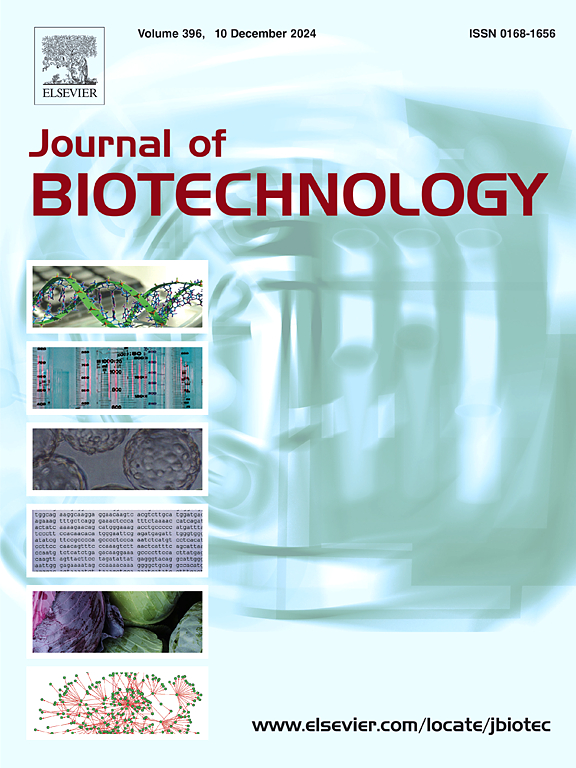代谢工程谷氨酸棒状杆菌发酵生产α-酮异戊酸酯和α-酮异己酸酯
IF 3.9
2区 生物学
Q2 BIOTECHNOLOGY & APPLIED MICROBIOLOGY
引用次数: 0
摘要
α-酮异戊酸酯(KIV)和α-酮异己酸酯(KIC)被广泛用作食品添加剂和合成药物和高级醇。目前的化学合成方法对环境有害,全细胞催化过程由于底物昂贵而成本高昂。从葡萄糖中直接发酵生产KIV和KIC是一种很有前途的替代方法,尽管这方面的研究仍然有限。在这项研究中,我们设计了一种过量生产l -缬氨酸的谷氨酸棒状杆菌菌株,用于KIV和KIC的生产。我们灭活了亮氨酸脱氢酶和异丙酸酯合酶,阻断了L-缬氨酸和KIC的形成,结果在5-L发酵罐中产生了53.5 g/L的KIV,产率为0.16 g/g葡萄糖,产率为0.70 g/L·h⁻¹ 。接下来,我们在基于质粒的系统中引入反馈抗性leuA (leuAfbr),删除转录抑制基因ltbR,并在强启动子下增加leuCD和leuB的基因拷贝数,从而过度表达l -亮氨酸生物合成途径中的基因(leuA, leuCD和leuB),从而创造出高kic产量的菌株。乙酸的补充增加了乙酰辅酶a的供应,增加了KIC的产量,同时减少了KIV的积累。最终菌株在5-L发酵罐中产生79.8 g/L KIC,产率为0.29 g/g葡萄糖,产率为1.05 g/L·h⁻¹ ,超越了之前的发酵结果和大多数全细胞催化过程,突出了其工业应用潜力。本文章由计算机程序翻译,如有差异,请以英文原文为准。
Fermentative production of α-ketoisovalerate and α-ketoisocaproate by metabolically engineered Corynebacterium glutamicum
Alpha-ketoisovalerate (KIV) and α-ketoisocaproate (KIC) are widely used as food additives and in the synthesis of pharmaceuticals and higher alcohols. Current chemical synthesis methods are environmentally harmful, and whole-cell catalysis processes are costly due to expensive substrates. Direct fermentative production of KIV and KIC from glucose is a promising alternative, although research in this area remains limited. In this study, we engineered an L-valine-overproducing Corynebacterium glutamicum strain for KIV and KIC production. We inactivated leucine dehydrogenase and isopropylmalate synthase to block the formation of L-valine and KIC, resulting in the production of 53.5 g/L KIV with a yield of 0.16 g/g glucose and a productivity of 0.70 g/L·h⁻¹ in a 5-L fermentor. Next, we overexpressed genes in the L-leucine biosynthesis pathway (leuA, leuCD, and leuB) by introducing a feedback-resistant leuA (leuAfbr) in a plasmid-based system, deleting the transcriptional repressor gene ltbR, and increasing the gene copy numbers of leuCD and leuB under a strong promoter, creating a high-KIC-producing strain. Acetate supplementation enhanced acetyl-CoA supply, increasing KIC production while reducing KIV accumulation. The final strain produced 79.8 g/L KIC with a yield of 0.29 g/g glucose and a productivity of 1.05 g/L·h⁻¹ in a 5-L fermentor, surpassing previous fermentation results and most whole-cell catalysis processes, highlighting its industrial application potential.
求助全文
通过发布文献求助,成功后即可免费获取论文全文。
去求助
来源期刊

Journal of biotechnology
工程技术-生物工程与应用微生物
CiteScore
8.90
自引率
2.40%
发文量
190
审稿时长
45 days
期刊介绍:
The Journal of Biotechnology has an open access mirror journal, the Journal of Biotechnology: X, sharing the same aims and scope, editorial team, submission system and rigorous peer review.
The Journal provides a medium for the rapid publication of both full-length articles and short communications on novel and innovative aspects of biotechnology. The Journal will accept papers ranging from genetic or molecular biological positions to those covering biochemical, chemical or bioprocess engineering aspects as well as computer application of new software concepts, provided that in each case the material is directly relevant to biotechnological systems. Papers presenting information of a multidisciplinary nature that would not be suitable for publication in a journal devoted to a single discipline, are particularly welcome.
 求助内容:
求助内容: 应助结果提醒方式:
应助结果提醒方式:


